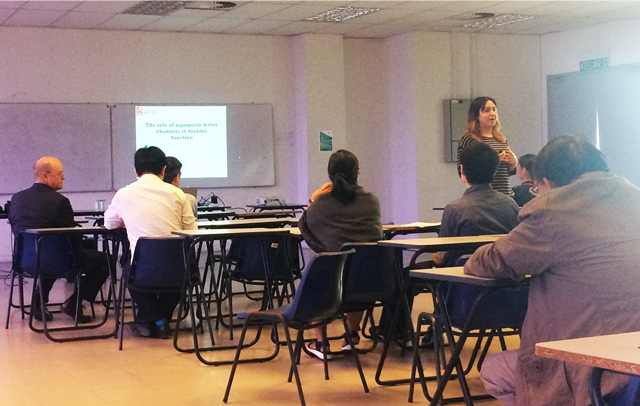

Invited speaker Dr Bahareh
Participants were enlightened by senior lecturer in Physiology and International Partnership Coordinator of University of the West of England Dr Bahareh Vahabi, when she shared information on the “Role of Aquaporin (AQP) Water Channels in Bladder Functions” at the talk organised by the Faculty of Science (FSc) on 27 November 2017 at the Kampar Campus.
Dr Bahareh presented her research and shared to participants that the aim of the research was to investigate the role of AQPs in modulating water and solute movement across the bladder urothelium, which may aid the development of novel therapeutic interventions for the treatment of debilitating conditions, such as nocturia and overactive bladder.
She mentioned that the urinary storage function is achieved by the property of the bladder serving as a reservoir, containing urine until “functional bladder capacity” (FBC) is reached, which will then signal the individuals of the need to pass urine.
However, she raised concerns that if urine output is insufficiently reduced during sleep, FBC may be reached and hence signalling the individual to wake up to pass urine, leading to nocturia, where the individuals wake up more than twice at night to pass urine.
She explained that nocturia is the leading cause of sleep deprivation and has a detrimental effect on general health and quality of life, and may also be associated with an increased risk of morbidity and mortality. Although she mentioned of current treatments that were designed to manage the lower urinary tract symptoms, such as overactive bladder of benign prostatic obstruction, the result shows only modest clinical improvement of nocturia.
With the understanding that nocturia can be caused by either excessive urine production at night, continuous production of urine, or reduced bladder capacity which is caused by conditions such as overactive bladder syndrome, she noted that AQPs are important for transepithelial water and solute movement in various tissues. The discovery of AQPs in the bladder urothelium also supports a more controversial hypothesis that urothelium is able to modify the composition and volume of urine in the lower urinary tract.
To achieve the research objective, Dr Bahareh’s research used a pig to investigate the expression and physiological function of AQP water channels in large animal bladder model and discovered the presence of AQPs 1, 3, 9 and 11 in the pig’s bladder. She believed that the identification of AQPs in the pig’s urinary bladder may point towards a functional role for these channels and potential mechanisms of regulating urine volume and osmolarity by the bladder.
Further research is still needed, but Dr Bahareh remains optimistic that the AQPs are important in regulating urine volume and osmolarity, and therefore act as potential targets for treatment of nocturia.

Dr Bahareh explaining about AQPs
© 2019 UNIVERSITI TUNKU ABDUL RAHMAN DU012(A).
Wholly owned by UTAR Education Foundation Co. No. 578227-M LEGAL STATEMENT TERM OF USAGE PRIVACY NOTICE